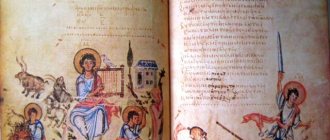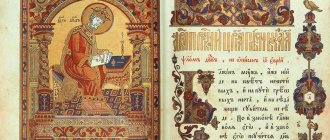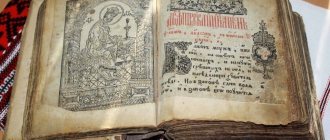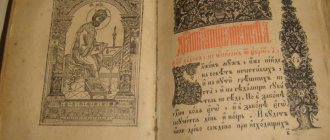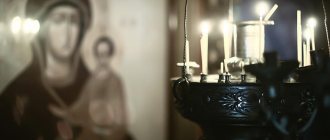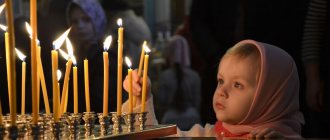Psalter. Kathisma 4
KATHISMA FOURTH.
Psalm 24.
Psalm to David.
1 To You, O Lord, I have lifted up my soul, my God, in You I have trusted, so that I will never be ashamed; let my enemies mock me, 2 for all those who endure You will not be ashamed. 3 Let the wicked be ashamed in vain. 4 Tell me Your ways, O Lord, and teach me Your paths. 5 Guide me in Your truth, and teach me that You are the God of my Savior, and I have endured You all the day. 6 Remember Your tender mercies, O Lord, and Your mercies, which have been from everlasting. 7 The sin of my youth and my ignorance do not remember; according to Your mercy, remember me, for the sake of Your goodness, O Lord. 8 The Lord is good and right; therefore He will give a law to those who sin in the way. 9 He will guide the meek in judgment, He will teach the meek in His way. 10 All the ways of the Lord are mercy and truth, to those who seek His covenant and His testimony. 11 For your name's sake, O Lord, cleanse away my sin, for it is much. 12 Who is the man who fears the Lord? He will lay the law on his path according to his will. 13 His soul will dwell in good things, and his seed will inherit the earth. 14 The Lord is the power of those who fear Him, and He will show His covenant to them. 15 I will lift up my eyes to the Lord, for He will pluck out my noses from the snare. 16 Look upon me and have mercy on me, for I am the only begotten and the poor. 17 The sorrows of my heart have multiplied, and lead me away from my needs. 18 See my humility and my labor, and forgive all my sins. 19 My enemies saw that they had multiplied, and they hated me with unrighteous hatred. 20 Preserve my soul and deliver me, that I may not be put to shame because I trusted in Thee. 21 I cleave to kindness and righteousness, because I have suffered Thee, O Lord. 22 O God, deliver Israel from all his sorrows.
Psalm 25.
Psalm to David.
1 Judge, O Lord, that I have walked in my kindness, and have trusted in the Lord, and I will not faint. 2 Tempt me, O Lord, and test me, kindle my bowels and my heart. 3 For Thy mercy is before my eyes, and I am well pleased in Thy truth. 4 I do not ride with the vain assembly, nor with the transgressors. 5 I hate the church of the wicked, and I will not sit with the wicked. 6 I will wash my innocent hands, and I will venerate Your altar, O Lord. 7 Let me hear the voice of Your praise, and tell me all Your wonders. 8 O Lord, I have loved the beauty of Your house and the dwelling place of Your glory. 9 Do not destroy my soul with the wicked, and do not destroy my life with the blood of men. 10 In the hand of iniquity, their right hand is filled with reward. 11 But I walk in my kindness, deliver me, O Lord, and have mercy on me. 12 My foot is in righteousness: in the churches I will bless Thee, O Lord.
Psalm 26.
Psalm to David, before the anointing.
1 The Lord is my enlightenment and my Savior, whom will I fear? Lord, Protector of my life, from whom shall I fear? 2 Sometimes you come close to me with malice, even if you tear away my flesh, insulting me, and defeating me, you become weak and fall. 3 Even if an army gathers against me, my heart will not fear; even if it rises up to fight against me, I will trust in Him. 4 I have asked one thing of the Lord, and this I will require: that I may dwell in the house of the Lord all the days of my life, that I may behold the beauty of the Lord, and that I may visit His holy temple. 5 For He hid me in His village in the day of my evils; He hid me in the secret of His village; He lifted me up on a rock. 6 And now, behold, I have lifted up my head against my enemies: I have eaten and devoured in His village a sacrifice of praise and shouting, I will sing and sing praises to the Lord. 7 Hear, O Lord, my voice, whereby I cried: have mercy on me, and hear me. 8 My heart says unto you, I will seek the Lord. I will seek Your face, O Lord, I will seek Your face. 9 Turn not Thy face away from me, nor turn away Thy servant with wrath: be my helper, do not deny me, nor forsake me, O God of my Savior. 10 Because my father and my mother abandoned me, but the Lord will receive me. 11 Give me the law, O Lord, in Thy way, and guide me in the right path for my enemy’s sake. 12 Do not betray me to the souls of those who afflict me, for I have stood up as a witness of unrighteousness and lied untruthfully to myself. 13 I believe to see the good of the Lord on the land of the living. 14 Be patient with the Lord, be of good courage and let your heart be strong, and be patient with the Lord.
Glory:
Psalm 27.
Psalm to David.
1 To Thee, O Lord, I will cry, O my God, that thou shalt not keep silence from me, lest thou never keep silence from me: and I shall become like them that go down into the pit. 2 Hear, O Lord, the voice of my prayer, always pray to You, always lift up my hands to Your holy temple. 3 Do not bring sinners with me, and do not destroy me with those who do injustice, who speak peace with their neighbors, but do evil in their hearts. 4 Give unto them, O Lord, according to their deeds, and according to the wickedness of their undertakings: give them according to the work of their hand: give them their reward. 5 Because I do not understand the works of the Lord and the work of His hand: I have destroyed, and I have not built. 6 Blessed be the Lord, for He hath heard the voice of my supplication. 7 The Lord is my Helper and my Defender: in Him my heart trusts, and He will help me, and my flesh may prosper, and I will confess my will to Him. 8 The Lord is the strengthener of His people, and the Defender of the salvation of His Christ. 9 Save Thy people and bless Thy inheritance, and save me and reward me forever.
Psalm 28.
Psalm to David, the departure of the tabernacle.
1 Bring to the Lord, sons of God, bring to the Lord, sons of rams, bring to the Lord glory and honor. 2 Bring glory to His name to the Lord; worship the Lord in the courtyard of His holy ones. 3 The voice of the Lord is upon the waters, the God of glory will roar, the Lord is upon many waters. 4 The voice of the Lord is strong, the voice of the Lord is great. 5 The voice of the Lord breaks in pieces the cedars, and the Lord tears down the cedars of Lebanon: 6 And I am destroyed like the calf of Lebanon, and the beloved like the son of a unicorn. 7 The voice of the Lord cutting off the flames of fire. 8 The voice of the Lord shaking the wilderness, and the Lord will shake the wilderness of Kaddi. 9 The voice of the Lord brings forth the oil, and opens the oak groves, and in His temple every word speaks of glory. 10 The Lord inhabits the flood, and the Lord will sit as King forever. 11 The Lord will give strength to His people; the Lord will bless His people with peace.
Psalm 29.
A psalm of song, renewal for the house of David.
2 I will exalt Thee, O Lord, for thou hast lifted me up, and thou hast not made my enemies glad over me. 3 Lord my God, I cried to You, and You healed me. 4 Lord, you have brought my soul up from hell, you have saved me from those who went down into the pit. 5 Sing to the Lord, you who are like Him, and confess the memory of His holiness. 6 For wrath is in His wrath, and life in His will: mourning may endure for an evening, and joy comes tomorrow. 7 But I said in my abundance: I will not move forever. 8 Lord, according to Your will, give strength to my kindness. You turned away Your face and was embarrassed. 9 To you, O Lord, I will cry, and to my God I will pray. 10 What is the use of my blood if I sometimes go into decay? Will the dust confess to You, or will He proclaim Your truth? 11 The Lord heard and had mercy on me: The Lord was my Helper. 12 Thou hast turned my weeping into my joy: thou hast torn my sackcloth to pieces, and thou hast girded me with gladness. 13 For my glory will sing to You, and I will not be moved: Lord my God, I will confess to You forever.
Glory:
Psalm 30.
In the end, a psalm to David, devotions.
2 In Thee, O Lord, have I trusted, that I may never be ashamed: in Thy righteousness deliver me and redeem me. 3 Incline Your ear to me, hasten to take me away, make me a Protector God and a house of refuge to save me. 4 For Thou art my power and my refuge, and for Thy name’s sake Thou shalt instruct me and nourish me. 5 Deliver me from the net of sowing, even hiding from me that You are my Protector, O Lord. 6 In Your hand I will offer my spirit: You have delivered me, O Lord God of truth. 7 You have hated those who keep vanities in vain: but I trusted in the Lord. 8 I will rejoice and rejoice in Your mercy, for You have looked upon my humility, You have saved my soul from need, 9 And You have shut me up in the hands of the enemy, You have placed me in the open ze mine. 10 Have mercy on me, O Lord, for I am in sorrow: my eye, my soul, and my belly are troubled with wrath. 11 For my life has vanished in sickness and my life in sighing, my strength is weakened by poverty and my bones are crushed. 12 From all my enemies there was reproach, and from my neighbors great, and fear from those who knew me: those who see me flee from me. 13 He was forgotten as if he were dead from the heart, like a vessel destroyed. 14 Because I heard the evil spirits of many who lived around, they came together against me and took counsel with me. 15 But I trusted in You, O Lord, and said: You are my God. 16 My lots are in Your hand: deliver me from the hand of my enemies and from those who persecute me. 17 Make Thy face shine upon Thy servant, save me by Thy mercy. 18 Lord, let me not be ashamed, because I called Thee: let them be ashamed of wickedness and go down to hell. 19 Let them be dumb with flattering lips, speaking against the righteous iniquity, with pride and humiliation. 20 Since the great abundance of Your goodness, O Lord, You have hidden from those who fear You, You have made them to trust in You before the sons of men. 21 Hide them in the secret of Your face from the rebellion of men, cover them with blood from the strife of tongues. 22 Blessed is the Lord, for He has astonished His mercy in the city of enclosure. 23 But I said in my confusion: I am rejected from before Thy sight: for this reason Thou hast heard the voice of my prayer, and at some time I cried out to Thee. 24 Love the Lord, all you who are like Him, for the Lord seeks the truth and rewards those who practice pride in excess. 25 Take courage, and let your heart be strong, all you who trust in the Lord.
Psalm 31.
Psalm to David, reason.
1 Blessed are those who have abandoned iniquity and who have hidden themselves behind sin. 2 Blessed is the man; the Lord will not impute sin to him; flattery is in his mouth. 3 Because I kept silent, my bones promised to call me all day long. 4 For Thy hand has been heavy upon me day and night; I have returned to passion when thorns fell upon me. 5 I know my iniquity and my sin is not covered, reh: let me confess my iniquity to the Lord, and you have forsaken the wickedness of my heart. 6 Therefore, everyone who is holy will pray to You in the time of need: otherwise in the flood of many waters they will not come close to him. 7 You are my refuge from sorrow, holding me back: my joy, deliver me from those who have bereaved me. 8 I will admonish you and guide you on this path; when you go, I will establish My eyes on you. 9 Do not be like a horse or horse that has no understanding; you will bind their jaws with bridles and bridles that do not come near you. 10 Many are the wounds of the sinner, but he who trusts in the Lord will receive mercy. 11 Rejoice in the Lord, and rejoice in righteousness, and rejoice, with all that is right in heart.
Glory:
According to the 4th kathisma, the Trisagion of Our Father: Also troparia, tone 7:
Visit my humble soul, Lord, who has spent all her life in sins: in the image of the harlot, accept me and save me.
Swimming through the abyss of this life, I think about the abyss of my many evils, and having no nourishment for my thoughts, Petrov proclaims to Thee a voice: save me, O Christ, save me, O God, as a Lover of Mankind .
Glory: We will soon become the bride of Christ, so that we will all hear the blessed voice of Christ our God: come, you who love Heavenly glory, partakers of the former wise virgins, who have understood our candles in eroyu.
And now: Soul, repent before your departure; the judgment of sinners is unwashed and intolerable. Cry out to the Lord with tenderness of heart: I have sinned in knowledge and in ignorance, O Generous One, through the prayers of the Mother of God, spare me and save me.
Lord, have mercy (40) and prayer:
To You, Lord, the only Good and Unforgettable Evil One, I confess my sins, I fall down crying to You, unworthy: I have sinned, Lord, I have sinned and am not worthy to look up to the heights of heaven from the multitude of iniquities. For my sake. But, my Lord, Lord, grant me tears of tenderness, the only Blessed and Merciful One, as I beseech Thee with them, to be cleansed before the end from all sin: it is a terrible and terrible place for the Imam to pass through. and the bodies were separated, and a multitude of gloomy and inhuman demons fell upon me, and no one can help or deliver. Thus I bow to Your goodness, do not betray me to those who offend me, below let my enemies boast about me, Good Lord, below let them say: You came into our hands, and You were betrayed to us. Neither, Lord, do not forget Your bounties and do not repay me for my iniquities, and do not turn Your face away from me: but You, Lord, punish me, both with mercy and bounty. Let my enemy not rejoice over me, but extinguish his reproaches against me and abolish all his actions, and give me a reproachful path to You, Good Lord: even though I have sinned, I have not resorted to another doctor, and I have not lost my hand. to a foreign god , do not deny my prayer, but hear me with Your goodness and strengthen my heart with Your fear, and may Your grace be upon me, Lord, like a fire that burns up unclean thoughts in me. For you are, Lord, light, more than any light; joy, more than any joy; repose, more than any repose; true life and salvation that endures forever and ever, amen.
On the commemoration of the dead according to the statutes of the Orthodox Church
Preparing for demise
The Orthodox Church guides each of its members to the afterlife with the Sacraments of Confession and Holy Communion. In case of mortal danger, first of all, care should be taken to invite a priest to the sick person to perform these Sacraments, so as not to appear before God unprepared and uncleaned. During serious illnesses, the Holy Church calls on her children to also resort to the Sacrament of Anointing, in which, when anointing the body with oil, the grace of God is invoked on the sick person, healing from illnesses and remission of sins is asked. Therefore, this Sacrament must be performed during the intensification of the illness, with the faith that the days of a person’s earthly life will be extended for repentance and correction.
When the soul is separated from the body and moves into the spiritual world, it especially needs our prayerful help. To facilitate the very last minutes of a Christian’s earthly life, special canons are read on the exodus of the soul from the body: to the Lord our God Jesus Christ and the Most Pure Mother of God and the canon “when a person suffers for a long time.” The canons are filled with great repentance and prayers for God’s mercy to those departing to another world. In the absence of a priest, both canons on the outcome of the soul can and should be read at the bedside of a dying person by a layman. In our publication, according to the instructions of St. Athanasius (Sakharov), they are combined into one Follow-up for the separation of the soul from the body of every true believer
(see:
Afanasy Sakharov
, bishop. On the commemoration of the departed according to the charter of the Orthodox Church. - St. Petersburg: Satis, 1999. P. 137).
The canons on the outcome of the soul do not have to be read directly next to the dying person. If a person dies in a hospital, the canons can be read at home. The main thing is to help the soul in these most difficult moments for it. If a Christian gives up the ghost while reading the canons, then they are finished reading with the funeral refrain: “Rest, O Lord, to the soul of Thy departed servant...”. And after the 9th song they end with the End of the funeral canons.
Upon the departure of the soul from the body, they begin to read the Canon about the deceased
(p. 361). If a person died not at home, read the canon upon receiving news of his death.
Funeral reading of the Psalter
Reading the Psalter can begin immediately after death and not necessarily directly above the coffin. The custom of singing psalms at the tomb of the deceased came from deep early Christian antiquity. This is both the strongest help from the living to the soul of the deceased, who is going through terrible ordeals in the first days, and consolation for grieving loved ones.
Reading the Psalter before burial differs from reading it later during home prayer. It is performed according to a special rite, it is advisable not to interrupt it either day or night. It is necessary to read the entire Psalter over the tomb at least once. At the same time, only the newly deceased are commemorated; other deceased should not be commemorated.
Prayers for the departed on Bright Week
If a person died on Bright Week (from the day of Holy Easter to Saturday of Bright Week inclusive), then instead of the funeral service the Easter Canon
. In all cases when the Litia is supposed to be read, the Easter stichera are sung: “May God rise ...” and “Holy Easter ...”, that is, at the position in the coffin, at the removal of the body from the house and before and after burial in the cemetery.
Instead of the Psalter on Bright Week, according to tradition, the Acts of the Holy Apostles are read. They begin the reading with the words: “Through the prayers of the holy Apostle and Evangelist Luke, Lord Jesus Christ, the Son of God, have mercy on us, Amen,” after reading: “To our God be glory always, now and ever, and unto ages of ages, Amen.”
Reading the Acts of the Holy Apostles contains both prayer for the deceased and consolation to relatives. The pagans have a custom of mourning, hysterical sobs and screams, tearing their clothes. We, Christians, believe that life does not end with death, that the death of the body is not the death of the soul, that the soul is immortal. Therefore, we must accompany the soul of the one who has left us in quiet prayer.
Burial
During burial, the coffin with the body of the deceased is taken out of the house, transferred to the temple and from the temple to the grave while the “Trisagion” is chanted. On Bright Week, the deceased is seen off to the singing of “Christ is risen from the dead...”. A cross or icon is carried in front. In some villages, the custom of a funeral procession with a cross and banners is still preserved. An orchestra is inappropriate at the funeral of Orthodox Christians.
Days of Remembrance of the Dead
The first forty days after death are dedicated to intense prayers for the deceased; all these days he is referred to in prayers as the newly deceased. A special commemoration is made on the third day - in remembrance that our Lord Jesus Christ rose from the dead “on the third day according to Scripture.” On the ninth day, we pray that through the intercession and prayers of the nine angelic orders, the soul of the deceased will be pardoned. And on the fortieth day - in memory of the fact that our Lord Jesus Christ ascended to Heaven on the fortieth day after His Resurrection. There is also a pious custom to perform a special commemoration on the twentieth day after death and six months later.
The main days of remembrance of the deceased are anniversaries of death, as well as namesake days. Commemoration is also obligatory on Ecumenical Parental Saturdays: Meat (the week before Lent), Trinity (before the Holy Trinity Day), as well as on Parental Saturdays of the 2nd, 3rd and 4th weeks of Lent, on Radonitsa and Dimitrievskaya Saturday. On Ecumenical Parental Saturdays, the Church especially prays for those who died a sudden death, for those pious Christians who, having passed into another world in a foreign land, from hunger and disease, at sea, in a fire, from troubles and misfortunes, “did not receive the legalized psalms and songs of memory " Radonitsa is the first commemoration of the dead after Holy Easter, on the 10th day, Tuesday of St. Thomas Week. Dimitrievskaya Saturday was established by the holy noble prince Dimitri Donskoy in memory of the soldiers who fell on the Kulikovo field. Subsequently, all Orthodox Christians began to be commemorated on this day.
In addition, all Saturdays of the year on which holidays do not fall are dedicated to the remembrance of the dead, because Saturday is a day of rest, “the seventh day... which the Lord blessed of old... rest from work” (Gen. 2:3). And because our Lord Jesus Christ, the Son of God, on this day “dwelt among the departed” (according to the words of St. Philaret of Moscow).
Church commemoration of the dead
The Holy Fathers of the Church teach that the most powerful and effective means for the departed to ask for God’s mercy is the Liturgy for the dead. Saint John Chrysostom said that “it was not in vain that the apostles legitimized the remembrance of the departed before the Terrible Mysteries: the apostles knew that this would be of great benefit to the departed, a great deed.” It is necessary, in the coming days after his death, to order a magpie in the church, that is, a commemoration at forty Liturgies: the Bloodless Sacrifice is offered forty times for the deceased, a particle is taken from the prosphora and immersed in the Blood of Christ with a prayer for the remission of sins of the newly deceased. This is the most necessary thing that can be done for the soul of the deceased.
During Great Lent, full Liturgies are served only on Saturdays and Sundays, so the magpie is usually ordered with St. Thomas week.
After forty days, an annual commemoration should be ordered and then renewed every year. You can also order a longer-term commemoration in monasteries - eternal, that is, while the monastery stands. There is a pious custom to order commemoration in several monasteries or churches. It is good to remember the deceased at the “unceasing” Psalter, that is, with the continuous reading of the Psalter, day or night.
On all days of remembrance of the deceased, it is necessary to submit notes about their repose and order memorial services in the temple. Commemoration is performed at every Liturgy.
Home prayers for the dead
The Holy Church considers prayer for the departed to be a necessary part of not only church services, but also household rules.
Of course, the main thing is the church commemoration of the dead, together with the pastors. But “we won’t blame everything on the priest.” We must work hard ourselves, in our home prayer. This is our duty to the departed, proof of our love for them. All the more necessary is home prayer on the days of remembrance of the dead, if it was impossible to remember them in church.
On the third, ninth, fortieth days and anniversaries (where customary, also on the twentieth day and half a year), the memory of the deceased should be honored by reading a Panikhida
.
During all forty days after death - a time of special commemoration, when the fate of the soul of the deceased is decided - the Canon about the deceased
.
All these sequences can be read both at home and in the cemetery.
On other days you can read or requiem
, or separately
Canons about the deceased, the deceased
.
They also remember the departed in the Psalter and read the memorial in morning (and, if desired, evening) prayers. the Canons about the deceased
for all your relatives .
We also publish the Canon of the Dead
, which takes place in the church only twice a year - on Meat and Trinity Ecumenical Parental Saturdays. But in home prayer you can read it at any other time - if you wish and are able, with the blessing of your confessor. This is the commemoration of all Orthodox Christians who have died from time immemorial.
There is a pious custom - once a year, remember all your relatives both in home prayer and at a memorial meal. You can choose for this either the day of remembrance of one of your relatives, or simply some convenient day for commemoration, when, according to the Charter, home funeral prayer is allowed, that is, not on holidays or Sundays.
It should be especially noted that you should definitely consult with a priest, and most importantly, with your spiritual father, about the composition and limits of your home prayer.
Funeral meal
The commemoration of the dead is usually accompanied by a funeral meal. If everyone present had previously attended a memorial service in the temple, then after the usual prayers before eating food, you can begin the meal. If many were unable to attend the memorial service in the church, then before the meal you should read either the Memorial Service
, or
the Canon of the Deceased
, whichever is possible.
The meal itself begins with eating kutia. According to custom, in Central Russia it is customary to serve pancakes and jelly at funerals. At the end of the meal, the funeral litia
.
It is unacceptable to place food or drinks on the table or even under icons as if for the dead. This is a pagan custom.
If the funeral meal is served on a fast day, then the table should be fast.
The Apostolic Rules prohibit the consumption of wine and other alcoholic beverages at funeral dinners. According to the words of St. John Chrysostom, the one who remembers the deceased by drinking wine does not intercede for deliverance from the torment of the soul of the deceased, but for the increase of the fire of hell for him.
A funeral meal is our almsgiving in memory of the deceased. The food at the funeral meal is supposed to be eaten in silence, making a prayer in the mind for the repose of the soul of the deceased.
When commemoration is not performed
According to the Church Charter, home funeral prayers and memorial meals are not performed on all Sundays, twelfths and great holidays, on Bright (Easter) Week, on Lazarus Saturday, Mid-Pentecost, Easter, on the last three days of Holy Week, as well as on the second Day of the Nativity of Christ, Epiphany, Holy Trinity.
On holidays and Sundays, an Orthodox Christian must be in church for the Liturgy and submit a note of repose at the proskomedia, and postpone the memorial meal to another day. On Christmas Eve and all Christmastide, you can pray for the departed at home, but you should not have funeral meals. If a person dies during Lent, all commemorations are transferred to Saturdays. The Typikon says that the third day is commemorated on the coming Saturday, and on the following Saturday the ninth day is celebrated, regardless of the count, since there are no funeral meals on weekdays during Great Lent.
The memory of the fortieth day, according to the Charter, should not be transferred, therefore, on the fortieth day it is necessary to hold a service in the temple, read the Panikhida at home, but there should not be any large gatherings, unless you can remember in a narrow circle of relatives, without, of course, breaking the fast . Everyone can gather for the sake of remembrance again next Saturday. The same must be done when the fortieth day falls on a holiday or Sunday.
During the first three days of Holy Week, a funeral litany is served in the church. You can pray for the departed at home. But starting from Vespers on Holy Thursday we stand before the Passion of Christ and the Holy Sepulcher - everything else falls silent.
If the ninth and fortieth days or anniversary fall on Bright Week, then notes can be submitted, but prayers for the deceased and memorial meals are not performed. After the burial on Bright Week, the dinner should not have the character of a funeral - neither kutia nor pancakes are served at the meal. All commemorations from Holy and Holy Weeks are transferred to Radonitsa. On Christmas Day and on the day of Holy Easter, burials are not even performed.
Prayers for those who died without repentance
Nowadays, many people, even being baptized, do not go to church, do not confess, do not partake of the Holy Mysteries of Christ, or do this extremely rarely. For them, as well as for all those who died suddenly and did not have time to properly prepare for their death, the Canon is read to St. Paisius the Great
. This saint, who worked all his life in monastic deeds, did not want to have any reward for them, only so that the soul of one young sinner would be spared from punishment. And the Lord mercifully accepted the vigils and tears of His servant and gave him special grace to intercede for those who died without repentance.
For whom the Church does not pray
The Orthodox Church does not perform funeral services and does not offer prayers for people who consciously rejected God and the Church, who fell away from Orthodoxy into schisms, heresies and sects, who were excommunicated from the Church, who were involved in the occult, magic, extrasensory perception, etc., as well as for those who deliberately committed suicide who took their own lives.
If the person who took his own life was mentally ill or was driven to suicide by bullying and oppression (for example, in the army or in prison), as well as in all dubious circumstances, it is necessary to obtain the blessing of the ruling bishop for the funeral and commemoration.
How to pray for the unbaptized and people of other faiths
Also, they do not perform funeral services or commemorate those who never belonged to the Orthodox Church: Catholics, Protestants, non-Christians and all those who died unbaptized. Church-wide prayer cannot be performed for their souls. But close relatives in home prayer can read the Canon to the Martyr Uar
who has grace from God to intercede for the dead who have not been worthy of Holy Baptism. (The names of those who died unbaptized are not mentioned.) From the life of the holy martyr Huar, it is known that through his intercession he delivered from eternal torment the relatives of the pious Cleopatra, who revered him, who were pagans.
The question often arises about the posthumous fate and commemoration of babies who died unbaptized or were killed in the womb of their mother. The life of St. Basil the New speaks of the revelation of God given to the saint’s disciple that unbaptized or innocently lost babies, although they cannot fully inherit eternal bliss, will be delivered from eternal torment. The Canon to the Martyr Uar is also read for them, for even if the pagans receive relief, then all the more do they deserve God’s mercy for the souls of these unfortunate babies.
On the benefits of prayers for the dead
“Whoever prays for the dead intercedes for himself life and salvation,” says St. John Chrysostom. – Prayers are not in vain, alms are not in vain: the Holy Spirit established all this, wanting us to benefit from each other, for the charity of the living in memory of the dead saves both. If the deceased is a sinner, then with our loving care we can help him a lot, and from a place of darkness and sorrow we can transfer him to the bright world of boundless happiness, and if the deceased is righteous, then he himself, being before the Throne of God, will respond to our love with a fervent prayer for our soul still in earthly life.”
Taking care of the salvation of the souls of the departed, praying for them to the Lord God, so that He will forgive them all sins, voluntary and involuntary, is the sacred duty of every son of the Orthodox Church. Christian love, by which we are all united in our Lord, prompts us to pray for the departed. This love unites us here on earth. It does not end with the transition to eternal life. After all, love, according to the words of the Apostle Paul, “never fails” (1 Cor. 13:8). The departed are our neighbors whom God calls us to love as ourselves. After all, the Lord did not command us to love our neighbors only while they live on earth. The Lord wants this love to go beyond the grave. Through remembrance and prayer we prove our enduring love for our dear departed.
Prayer for the dead and the emergence of tradition
The emergence of the tradition of commemorating the dead goes back to ancient times. People who experienced the loss of relatives or loved ones, at any opportunity, remembered them and mentally turned to deities and other objects of belief so that they would help the deceased and make it easier for them to find their final resting place.
In Christianity, it is believed that by pronouncing funeral words, a person receives consolation and releases the soul of the deceased into another world. Believers know that the one who loves is able to reconcile, but is not able to forget, and reading the psalms helps to communicate with Heaven and remember the loss.
The first person who believed in the power of commemorating the dead is considered to be the commander Judas. Because he and his subordinates believed in God, the Creator awarded their army with invincibility. But somehow the army was defeated, and many soldiers died in the battle. During the burial, Judas saw that many of the dead were carrying with them figurines of idols that were not associated with Christianity.
In order to direct at least their souls to the Kingdom of God, the commander began to pray, asking the Lord to forgive the ignorance of the soldiers. The Almighty liked Judas’s sincerity, and he forgave the dead, sending their souls to Paradise. It is believed that from this moment the tradition of commemorating the dead began.

